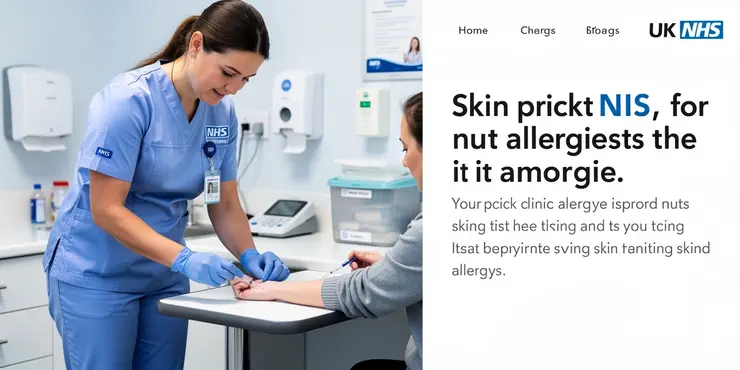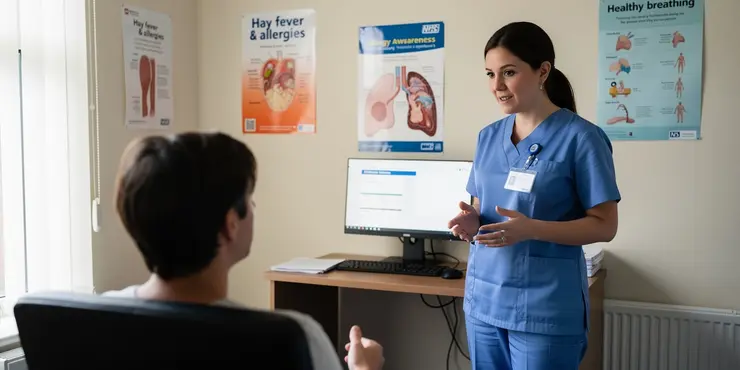
Find Help
More Items From Ergsy search
-

Can tree nuts and peanuts cause cross-reactions?
Relevance: 100%
-

What types of nuts can cause allergies?
Relevance: 50%
-

What are Nut Allergies?
Relevance: 44%
-

Can nut allergies be outgrown?
Relevance: 40%
-

Are nut oils safe for people with nut allergies?
Relevance: 40%
-

What are the symptoms of a nut allergy?
Relevance: 34%
-

Can nut allergies develop later in life?
Relevance: 29%
-

What is the difference between a nut allergy and intolerance?
Relevance: 29%
-

What should I do if I think I have a nut allergy?
Relevance: 28%
-

How can nut allergies be managed?
Relevance: 25%
-

Can I plant a tree on a woodland burial site?
Relevance: 24%
-

What foods should I avoid if I have a nut allergy?
Relevance: 24%
-
How can I prevent cross-contamination with nuts in the kitchen?
Relevance: 23%
-

Is there a cure for nut allergies?
Relevance: 22%
-

How is a nut allergy diagnosed?
Relevance: 21%
-

What should I tell my family and friends about my nut allergy?
Relevance: 20%
-

Is it safe to eat foods labeled as 'may contain nuts'?
Relevance: 19%
-

Is epinephrine the only treatment for severe nut allergy reactions?
Relevance: 18%
-
Can orange juice be allergenic?
Relevance: 14%
-

Are there any recent treatments or research developments for nut allergies?
Relevance: 13%
-

Do all plants produce pollen that causes hay fever?
Relevance: 12%
-

What foods can trigger nettle rash?
Relevance: 12%
-

How is Chikungunya virus infection diagnosed?
Relevance: 10%
-
Can I meet my fat requirements from plant-based sources?
Relevance: 10%
-
How can I ensure I'm getting enough healthy fats each day?
Relevance: 10%
-

What happens if I have special dietary needs?
Relevance: 9%
-

How can I shade my house to keep it cool during a heatwave?
Relevance: 9%
-
What types of fats are healthy to consume?
Relevance: 9%
-

Can children with nut allergies safely attend school?
Relevance: 9%
-

NHS Acute Care Anaphylaxis
Relevance: 8%
-

What is the difference between a woodland and natural burial?
Relevance: 8%
-

What is hay fever?
Relevance: 7%
-

How do I choose a woodland burial site?
Relevance: 7%
-
What alternatives are there to sunflower oil?
Relevance: 7%
-

Woodland and Natural Burials
Relevance: 7%
-

How can I keep my home cool without air conditioning?
Relevance: 7%
-

What foods are high in fiber?
Relevance: 7%
-
Are there specific fats that support heart health?
Relevance: 7%
-

What is anaphylaxis?
Relevance: 7%
-

What can I eat if I have Type 2 Diabetes?
Relevance: 7%
Understanding Cross-Reactions Between Tree Nuts and Peanuts
For many people, nuts are a popular and healthy dietary choice. However, for others, nuts are a source of serious allergic reactions. In the UK, food allergies are a growing concern, and understanding cross-reactions between tree nuts and peanuts is important for managing dietary risks and ensuring safety.
What Are Tree Nuts and Peanuts?
Tree nuts and peanuts are common allergens, but they belong to different botanical families. Tree nuts such as almonds, walnuts, and cashews grow on trees, while peanuts are legumes that grow underground. Despite this botanical difference, both can trigger allergic reactions, which sometimes leads to misconceptions about their relationship.
Allergic Reactions to Nuts
An allergic reaction occurs when the immune system mistakenly identifies proteins in food as harmful. Symptoms can range from mild, such as itching and hives, to severe anaphylaxis, which can be life-threatening. Individuals with nut allergies must be vigilant about avoiding accidental exposure.
Cross-Reactivity
Cross-reactivity happens when proteins in different substances are similar enough that the immune system reacts to both. In the context of tree nuts and peanuts, some individuals who are allergic to peanuts may also show allergies to certain tree nuts, and vice versa, due to similarities in protein structures. However, it is not guaranteed that an allergy to peanuts will result in an allergy to tree nuts or that a tree nut allergy will include peanuts.
Implications for Allergy Sufferers
Understanding cross-reactivity is crucial for those managing nut allergies. It is essential for patients to undergo specific allergy testing to determine their unique sensitivities. In the UK, consulting with an allergist is recommended to achieve an accurate diagnosis and to develop a personalised management plan that includes clearly identifying which foods to avoid.
Safety Precautions
For those with allergies to peanuts or tree nuts, strict avoidance is typically necessary to prevent reactions. Reading food labels is critical, as manufacturers are required to list these allergens on packaging. Additionally, cross-contamination during food preparation is a risk, so extra care must be taken, especially when dining out or consuming processed foods.
Conclusion
Although peanuts and tree nuts are from different families, cross-reactions can occur, complicating allergy management. Through careful diagnosis and awareness, individuals can better navigate the challenges of nut allergies. Partnering with healthcare professionals and staying informed are key strategies for those affected, ensuring a safer and more informed approach to dealing with these common allergens.
Understanding Reactions Between Tree Nuts and Peanuts
Lots of people enjoy eating nuts because they are healthy. But, some people can have bad allergic reactions to nuts. In the UK, food allergies are a growing problem. It's important to know how tree nuts and peanuts can cause these reactions. This helps people avoid risks and stay safe.
What are Tree Nuts and Peanuts?
Tree nuts and peanuts can cause allergies, but they are different. Tree nuts like almonds and walnuts grow on trees. Peanuts are not nuts; they grow underground and are called legumes. Even though they are different, both can cause allergies. Some people might think they are the same because of this.
Allergic Reactions to Nuts
Allergic reactions happen when the body thinks certain proteins in food are dangerous. This can cause mild problems, like itching and rashes, or severe problems, like trouble breathing. People with nut allergies should be careful to avoid eating nuts by mistake.
Cross-Reactivity
Cross-reactivity is when the body mistakes proteins in different foods as the same. Some people allergic to peanuts might also be allergic to tree nuts because of similar proteins. But not everyone with a peanut allergy is allergic to tree nuts, or the other way around.
What Allergy Sufferers Should Know
If you have nut allergies, it’s important to understand cross-reactivity. People should get tested to know what they are allergic to. Seeing an allergy doctor helps find out which foods to avoid. In the UK, an allergist can help create a safe eating plan.
Staying Safe
People with nut allergies should avoid nuts to stay safe. Always read food labels because nuts are listed there. Be careful about food preparation to avoid mixing allergens, especially when eating out or buying processed food.
Conclusion
Peanuts and tree nuts can cause cross-reactions, which makes managing allergies tricky. Getting diagnosed correctly and learning about your allergies helps manage them better. Working with doctors and staying informed are important to safely handle these allergies.
Frequently Asked Questions
What are tree nuts?
Tree nuts are nuts that grow on trees, including almonds, walnuts, cashews, pecans, hazelnuts, and Brazil nuts.
What are peanuts?
Peanuts are legumes, not true nuts, and grow underground. They are related to beans, lentils, and soy.
Can tree nuts cause allergic reactions?
Yes, tree nuts can cause allergic reactions in sensitive individuals, ranging from mild symptoms to severe anaphylaxis.
Can peanuts cause allergic reactions?
Yes, peanut allergies are common and can cause severe reactions, including anaphylaxis.
What is a cross-reaction?
A cross-reaction occurs when the immune system reacts to similar proteins found in different substances.
Do tree nuts and peanuts often cause cross-reactions?
Although peanuts and tree nuts can cause cross-reactions due to protein similarities, they belong to different families, so not every individual allergic to one is allergic to the other.
Why can tree nuts and peanuts cause cross-reactions?
Both tree nuts and peanuts contain proteins that can trigger similar immune responses in sensitive individuals.
Should people with a tree nut allergy avoid peanuts?
People with a tree nut allergy should consult an allergist, as some may also be allergic to peanuts and vice versa.
Is it common to be allergic to both peanuts and tree nuts?
While it's possible, not everyone with a peanut allergy is allergic to tree nuts, and vice versa.
How can cross-reactions between tree nuts and peanuts be diagnosed?
Allergists can perform skin prick tests, blood tests, and supervised food challenges to diagnose allergies and possible cross-reactions.
What foods should be avoided in a tree nut or peanut allergy?
Individuals should avoid the specific nuts they are allergic to, read labels carefully, and be cautious of cross-contamination.
Can cooking or processing affect cross-reactions between peanuts and tree nuts?
Heat can sometimes alter protein structures, but this does not necessarily prevent allergic reactions.
Are there common products that can cause cross-reactions?
Processed foods, candies, and baked goods can contain traces of both peanuts and tree nuts, leading to potential cross-reactions.
What precautions can be taken to avoid cross-reactions from peanuts and tree nuts?
Always read food labels, avoid foods with unspecified nuts, carry an epinephrine auto-injector, and inform others about your allergy.
Are there any regulations regarding labeling of peanuts and tree nuts?
In many countries, foods must label common allergens, including peanuts and specific tree nuts, to alert consumers.
Is allergy immunotherapy effective for preventing cross-reactions between peanuts and tree nuts?
Allergy immunotherapy can be effective for some, but it depends on the individual's specific allergies and should be discussed with a healthcare provider.
Can infants develop cross-reactions to peanuts and tree nuts?
Infants can develop allergies, and early introduction of potential allergens in a controlled manner might help prevent severe reactions.
What role do genetics play in cross-reactions between peanuts and tree nuts?
Genetics can influence the likelihood of developing allergies, including those to peanuts and tree nuts.
Can cross-reactions between peanuts and tree nuts be managed?
Yes, with the right precautions and guidance from healthcare providers, many individuals can effectively manage their allergies and avoid cross-reactions.
What should one do in case of a cross-reaction between peanuts and tree nuts?
In case of a suspected allergic reaction, seek immediate medical help, use an epinephrine auto-injector if prescribed, and follow up with an allergist.
What are tree nuts?
Tree nuts are a kind of food that grows on trees.
Some examples of tree nuts are:
- Almonds
- Walnuts
- Cashews
If you don't know what a word means, you can ask someone for help.
Tree nuts are nuts that grow on trees. Some examples are almonds, walnuts, cashews, pecans, hazelnuts, and Brazil nuts.
If you need help reading, try using finger-tracking or reading with a buddy. These can help make reading easier and more fun!
What are peanuts?
Peanuts are small, brown nuts. They grow under the ground. People eat peanuts as a snack. You can also find peanuts in peanut butter.
Here are some tips to help understand this:
- Look at pictures of peanuts to see what they look like.
- Ask someone to show you a peanut.
- Try tasting a peanut if you can.
Peanuts are a type of plant food. They are not real nuts. They grow under the ground. Peanuts are like beans, lentils, and soybeans.
Can tree nuts make you sick?
Some people can't eat tree nuts like almonds, walnuts, and cashews because they can make them feel sick. This is called being allergic to tree nuts.
If someone is allergic and eats tree nuts, they might start itching or get a rash. They could also have trouble breathing or feel bad inside their tummy.
If you think you might be allergic to tree nuts, talk to a doctor. They can help you know for sure and tell you what to do next.
It’s a good idea to learn about what foods have tree nuts in them. This way, you can avoid them and stay safe.
There are apps and stickers that can help show which foods have tree nuts. These can help you know what is safe to eat.
Yes, some people can be allergic to tree nuts. This means nuts can make them feel sick. It can be a little problem or a big one that needs help from a doctor.
Here are some things that can help:
- Avoid eating nuts if you know you are allergic.
- Tell people you are allergic so they can help keep you safe.
- Have a special medicine, like an EpiPen, if a doctor says you need it.
Can peanuts make you sick?
Peanuts can sometimes make people feel very sick. This is called an allergy. If you feel sick after eating peanuts, tell an adult. They can help you see a doctor.
If you are worried about allergies, you can:
- Check food labels for peanuts.
- Ask an adult before trying new food.
- Always have an adult with you when you try something new.
Yes, lots of people are allergic to peanuts. This allergy can make them very sick and even stop them from breathing.
What is a cross-reaction?
A "cross-reaction" is when your body is confused. Your immune system thinks something harmless is bad. It might mix up things that are similar even if they are not the same.
If you struggle with reading, you can try:
- Reading out loud to hear the words.
- Using picture cards to help you understand.
- Asking someone to explain it to you.
A cross-reaction happens when the body's defense system (immune system) responds to proteins that look alike in different things.
Can tree nuts and peanuts cause the same allergies?
People who are allergic to tree nuts might also be allergic to peanuts. This is because their bodies can react to both in a similar way.
If you have an allergy, it's important to talk to a doctor. They can do tests to find out what foods are safe for you.
Using a food diary can help you track what you eat and any reactions you have. This can help your doctor understand your allergies better.
Peanuts and tree nuts can sometimes cause allergies because they have similar proteins. But they are from different families. Not everyone who is allergic to peanuts is allergic to tree nuts.
Why do tree nuts and peanuts sometimes cause the same reactions?
Tree nuts and peanuts can make some people feel sick because they have similar stuff in them. This can trick the body.
If you are allergic to one, you might react to the other too.
Try using pictures or talk with someone who knows about allergies for help.
Both tree nuts and peanuts have stuff inside them called proteins. For some people, these proteins can make their bodies have a reaction. This is called an allergy.
Do people who are allergic to tree nuts need to stay away from peanuts?
People who are allergic to tree nuts, like almonds and walnuts, might wonder if they should stay away from peanuts too.
Tree nuts and peanuts are different. Tree nuts grow on trees, while peanuts grow underground.
But, some people who are allergic to tree nuts might also be allergic to peanuts. It is important to talk to a doctor to know for sure.
If you have a tree nut allergy, use these tips:
- Ask a doctor about peanuts. They can help you understand your allergies.
- Read food labels carefully to see what is inside.
- Tell your friends and family about your allergy.
If you are allergic to tree nuts, talk to a doctor. Some people who are allergic to tree nuts might also be allergic to peanuts.
Can you be allergic to both peanuts and tree nuts?
Some people are allergic to peanuts. Some are allergic to tree nuts. You can be allergic to both.
If you think you have allergies, talk to a doctor.
Helpful things to use:
- Ask an adult for help when reading food labels.
- Keep a list of foods you should not eat.
- Learn about using an EpiPen in case of a bad allergic reaction.
Just because you have a peanut allergy doesn't mean you are allergic to tree nuts too. And the other way around is true as well.
How do doctors find out if tree nuts and peanuts cause problems together?
Doctors can use tests to see if eating tree nuts and peanuts makes you feel sick.
Here are some ways they do this:
- Skin Prick Test: A doctor puts a small drop of nut liquid on your skin and pokes it gently. If a bump shows up, you might be allergic.
- Blood Test: A doctor takes a bit of your blood to check if nuts make your body react.
- Food Challenge: You eat a little bit of nut in a safe place with a doctor. This helps them see if nuts make you feel bad.
Tools to Help:
- Pictures of nuts to learn which ones are safe.
- Apps that help you keep track of which foods make you feel good or bad.
Doctors who help with allergies can do a few different tests to find out what makes you sneeze or get a rash. They can use a tiny prick on your skin, take a small amount of blood, or watch you eat a little bit of the food that might give you trouble.
What foods should you stay away from if you are allergic to tree nuts or peanuts?
If you are allergic to tree nuts or peanuts, you should not eat them. Here are some things to help you:
- Read labels on food packages. Look for warnings about nuts and peanuts.
- Do not eat foods like peanut butter, nut butter, or nut milk.
- Stay away from cookies, cakes, and candies with nuts or peanuts.
- Be careful with foods at restaurants or parties because they might have nuts.
- Ask an adult to help you check food is safe.
You can also carry a card to show if you have an allergy. Make sure grown-ups around you know about your allergy too.
If you are allergic to certain nuts, don't eat them. Always read food labels carefully. Be careful of nuts getting mixed with other foods.
Can cooking or changing peanuts and nuts change how they affect each other?
Heat can sometimes change how proteins look, but it doesn't always stop allergies from happening.
Can some everyday things cause cross-reactions?
Some foods like snacks, sweets, and cakes might have tiny bits of peanuts or tree nuts in them. This can make people who are allergic to nuts feel sick.
How can you stay safe from peanut and tree nut reactions?
If you want to be safe from peanut and tree nut reactions, here is what you can do:
- Do not eat foods with peanuts or tree nuts.
- Always read food labels. Look for peanuts and tree nuts.
- Ask about ingredients when you eat out.
- Keep away from people eating peanuts or tree nuts, to avoid touching or smelling them.
- Always have your medicine (like an epinephrine pen) if you need it.
- Tell friends and teachers about your allergy.
- Use a bracelet or necklace that says you have an allergy.
Always look at food labels. Do not eat foods that just say nuts. Always have your medicine pen with you. Tell people about your allergy.
Are there any rules for labeling peanuts and tree nuts?
Yes, there are rules to help people know if foods have peanuts or tree nuts in them.
These rules tell food makers they must say clearly on the label if their food has peanuts or tree nuts.
If you find it hard to read labels, ask someone to help you check for peanuts or tree nuts.
You can also use a magnifying glass to help you read small print.
In lots of countries, food packages must have labels. These labels tell you if the food has things like peanuts or certain tree nuts in them. This helps people know if they might get sick from eating it.
Can allergy treatment help stop reactions between peanuts and tree nuts?
Allergy treatment is a way to help when someone is allergic to things.
This question is asking if the treatment can stop the body from reacting to both peanuts and tree nuts.
If you have allergies, it is good to talk to a doctor. They can help you find the best way to feel better.
Using pictures and talking with a helper can also make this information easier to understand.
Allergy treatment can help some people. It works best if you talk to a doctor about your allergies.
Can babies have allergies to peanuts and tree nuts?
Babies might get allergies to peanuts and tree nuts. This means their body says "no" to these foods.
If a baby eats or touches peanuts or tree nuts, they might feel sick.
To keep babies safe, talk to a doctor. They can help you understand allergies and keep your baby healthy.
It might help to use pictures or videos to explain allergies to your child.
Babies can get allergies. Letting babies try foods that might cause allergies in a careful way early on might stop strong allergic reactions.
How do your genes affect how your body reacts to peanuts and tree nuts?
Your genes are like a map. They tell your body how to work. Sometimes, your genes may cause your body to react to peanuts and tree nuts in the same way. This is called a "cross-reaction".
If you want to understand more, you can:
- Speak to a doctor.
- Read books for kids about genes and allergies.
- Use picture cards to learn new words.
Your genes can make it more likely that you will have allergies. This includes allergies to peanuts and nuts from trees.
Can you handle cross-reactions between peanuts and tree nuts?
People might be allergic to peanuts and tree nuts. These are different types of nuts.
Sometimes, if you are allergic to peanuts, you might also react to tree nuts. This is called a cross-reaction.
Here’s how you can manage these reactions:
- Talk to your doctor: They can test which nuts you are allergic to.
- Read food labels: Check if any food has peanuts or tree nuts.
- Carry medicine: Keep allergy medicine, like an EpiPen, with you.
- Ask questions: When eating out, ask if the food has nuts.
These steps can help you stay safe.
Yes, with the right help and advice from doctors, many people can handle their allergies and avoid getting sick from them.
What to do if you react to peanuts and tree nuts?
If you think someone is having an allergic reaction, get medical help right away. Use an epinephrine auto-injector if the doctor gave you one. Make sure to talk to an allergy doctor after that.
Useful Links
This website offers general information and is not a substitute for professional advice.
Always seek guidance from qualified professionals.
If you have any medical concerns or need urgent help, contact a healthcare professional or emergency services immediately.
Some of this content was generated with AI assistance. We’ve done our best to keep it accurate, helpful, and human-friendly.
- Ergsy carfully checks the information in the videos we provide here.
- Videos shown by Youtube after a video has completed, have NOT been reviewed by ERGSY.
- To view, click the arrow in centre of video.
- Most of the videos you find here will have subtitles and/or closed captions available.
- You may need to turn these on, and choose your preferred language.
- Go to the video you'd like to watch.
- If closed captions (CC) are available, settings will be visible on the bottom right of the video player.
- To turn on Captions, click settings .
- To turn off Captions, click settings again.
More Items From Ergsy search
-

Can tree nuts and peanuts cause cross-reactions?
Relevance: 100%
-

What types of nuts can cause allergies?
Relevance: 50%
-

What are Nut Allergies?
Relevance: 44%
-

Can nut allergies be outgrown?
Relevance: 40%
-

Are nut oils safe for people with nut allergies?
Relevance: 40%
-

What are the symptoms of a nut allergy?
Relevance: 34%
-

Can nut allergies develop later in life?
Relevance: 29%
-

What is the difference between a nut allergy and intolerance?
Relevance: 29%
-

What should I do if I think I have a nut allergy?
Relevance: 28%
-

How can nut allergies be managed?
Relevance: 25%
-

Can I plant a tree on a woodland burial site?
Relevance: 24%
-

What foods should I avoid if I have a nut allergy?
Relevance: 24%
-
How can I prevent cross-contamination with nuts in the kitchen?
Relevance: 23%
-

Is there a cure for nut allergies?
Relevance: 22%
-

How is a nut allergy diagnosed?
Relevance: 21%
-

What should I tell my family and friends about my nut allergy?
Relevance: 20%
-

Is it safe to eat foods labeled as 'may contain nuts'?
Relevance: 19%
-

Is epinephrine the only treatment for severe nut allergy reactions?
Relevance: 18%
-
Can orange juice be allergenic?
Relevance: 14%
-

Are there any recent treatments or research developments for nut allergies?
Relevance: 13%
-

Do all plants produce pollen that causes hay fever?
Relevance: 12%
-

What foods can trigger nettle rash?
Relevance: 12%
-

How is Chikungunya virus infection diagnosed?
Relevance: 10%
-
Can I meet my fat requirements from plant-based sources?
Relevance: 10%
-
How can I ensure I'm getting enough healthy fats each day?
Relevance: 10%
-

What happens if I have special dietary needs?
Relevance: 9%
-

How can I shade my house to keep it cool during a heatwave?
Relevance: 9%
-
What types of fats are healthy to consume?
Relevance: 9%
-

Can children with nut allergies safely attend school?
Relevance: 9%
-

NHS Acute Care Anaphylaxis
Relevance: 8%
-

What is the difference between a woodland and natural burial?
Relevance: 8%
-

What is hay fever?
Relevance: 7%
-

How do I choose a woodland burial site?
Relevance: 7%
-
What alternatives are there to sunflower oil?
Relevance: 7%
-

Woodland and Natural Burials
Relevance: 7%
-

How can I keep my home cool without air conditioning?
Relevance: 7%
-

What foods are high in fiber?
Relevance: 7%
-
Are there specific fats that support heart health?
Relevance: 7%
-

What is anaphylaxis?
Relevance: 7%
-

What can I eat if I have Type 2 Diabetes?
Relevance: 7%


